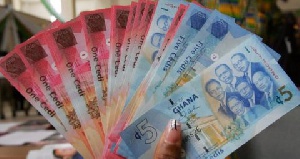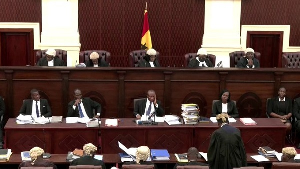Growth of currency outside banks reduced by 3.0 per cent to 16.2 per cent in January 2017, according to the latest Summary of Economic & Financial Data Report from the Bank of Ghana (BoG).
The report released by the Bank of Ghana indicates that the growth of money outside banks which went down heavily to 10.6 percent in October 2016 but inched up to 20.2 percent in November 2016 ended last year at 19.2 percent.
However, time and savings deposits grew more than demand deposits that is current and savings accounts at the end of January 2017. While demand deposits grew by 32.7 percent in January 2017, time deposits shot up by 32.7 percent. Before that demand deposits had grown higher than savings deposits.
The report further stated that deposits shot up consistently from August to December 2016 and then January and February 2017, to hit GH¢53.2 billion. August, September, October, November and December 2016 registered deposits of GH¢44.2, GH¢44.3, GH¢47.2, GH¢48.0 and GH¢51.7billion respectively.
Liquidity grew high at 27.0 percent in January 2017 as against 19.6 and 17.2 percent in November and December respectively.
It added that total assets of the banking industry stood at GH¢83.6 billion at the end of February 2017. This is against GH¢73.8 billion in October 2016, GH¢77.5 billion in November 2016 and GH¢81.2 billion respectively.
Loans and advances also went up to GH¢36.0 billion in February 2017 against GH¢35.4 in December 2016 and GH¢35.1billion in January 2017.
The banking sector’s capital adequacy ratio also increased from 17.8 percent in December 2016 and January 2017 respectively to 18.5 percent in December 2016. Non-performing loans stood at 17.7 percent in February 2017. This is against 18.0 percent in January 2017 and 17.3 percent in December 2016. The banks in Ghana made a provision of about 8.6 percent as bad debts in their books at the end of February 2017, the Report reiterated.
The performance could once again affect the bottom lines of some banks. The cedi however depreciated by 0.9 and 5.0 percent in January and March 2017 respectively against the US dollar.
Banks operating in Ghana registered a negative 4.3 percent for the 2016 financial year, according to the Financial Stability Report by the Bank of Ghana.
Click to view details



Business News of Thursday, 6 April 2017
Source: The Finder

















